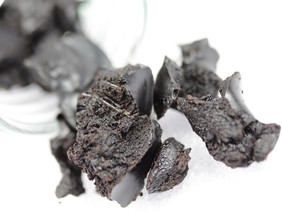In the "Lignin Foam" project, the Fraunhofer Institute for Wood Research, Wilhelm-Klauditz-Institute (WKI) is working with four industrial partners, including Volkswagen AG, to develop a bio-based, economical foam for the automotive industry. The researchers are focusing on the direct foaming of unpurified lignosulphonate. The target product is a core element for car bumpers. The project is being funded by the Federal Ministry of Food and Agriculture (BMEL) via Fachagentur Nachwachsende Rohstoffe e. V. (FNR) until the end of 2026.
An isocyanate-free rigid foam consisting of over 90% lignin would be a novelty. The "lignin foam" team is aiming for this high proportion. It also wants to use residues from pulp production, such as undigested fibre bundles, as a reinforcing material. The bio-based content of the new material could therefore be very high and ideally amount to 100%. In contrast, the lignin content of lignin-based polyurethane foams already described in the literature is only just under 40%.
The researchers are focusing on process steps that have already proven their feasibility on a very small scale: Lignosulphonate can be foamed and cross-linked directly with hydrogen peroxide. This eliminates the need for cost-intensive purification and the raw material is comparatively cheap. Using selected bio-based fatty acids and latex, the team then wants to achieve the required compressive elasticity and set application-specific properties. Humins are added as additives. Humins are produced in a new process for manufacturing polyethylene furanoate (PEF), a bio-based substitute for the bulk plastic polyethylene terephthalate (PET). The polymer manufacturer Avantium from the Netherlands wants to use the new process to produce PEF on an industrial scale in future and will provide the humic substances as an associated partner. Finally, the focus is on injection moulding and foam extrusion as suitable moulding processes for component production.
The aim is to successfully optimise and upscale the process described. The new lignin foam must replace expanded polypropylene (EPP) in the bumper application area, which scores points for its low weight, high energy absorption and good resilience. Among other things, these properties reduce the risk of injury to pedestrians in the event of a collision. The requirements of the project are therefore very high. However, if successful, it would not only provide a renewable material for the automotive industry, but could also open up new business areas for paper and pulp mills. Finally, if lignin is used more as a material in the future, the resource efficiency of wood use will increase.
Background:
Lignin is a by-product of the chemical pulping of wood and other plant fibres in pulp mills and paper factories. Due to a lack of alternatives, it has so far mainly been incinerated to generate energy, with only 2 % being used as a material.
Depending on the pulping process and the solvents used, there are different types of lignin: so-called kraft lignin comes from the sulphate process, which dominates global pulp production. In Germany, on the other hand, the sulphate process is more widespread, where lignosulphonate are the product. Lignosulphonates are particularly suitable for material use, and around 3 million tonnes of them are produced worldwide every year.
Further information is available in the FNR project database (fnr.de) under the funding codes 2220NR271A, 2220NR271B and 2220NR271C.
Contact:
Fachagentur Nachwachsende Rohstoffe e.V.
Markus Baumann
Tel.: +49 3843 6930-355
E-Mail: m.baumann@fnr.de
Press contact:
Fachagentur Nachwachsende Rohstoffe e.V.
Nicole Paul
Tel.: +49 3843 6930-142
Mail: n.paul@fnr.de

